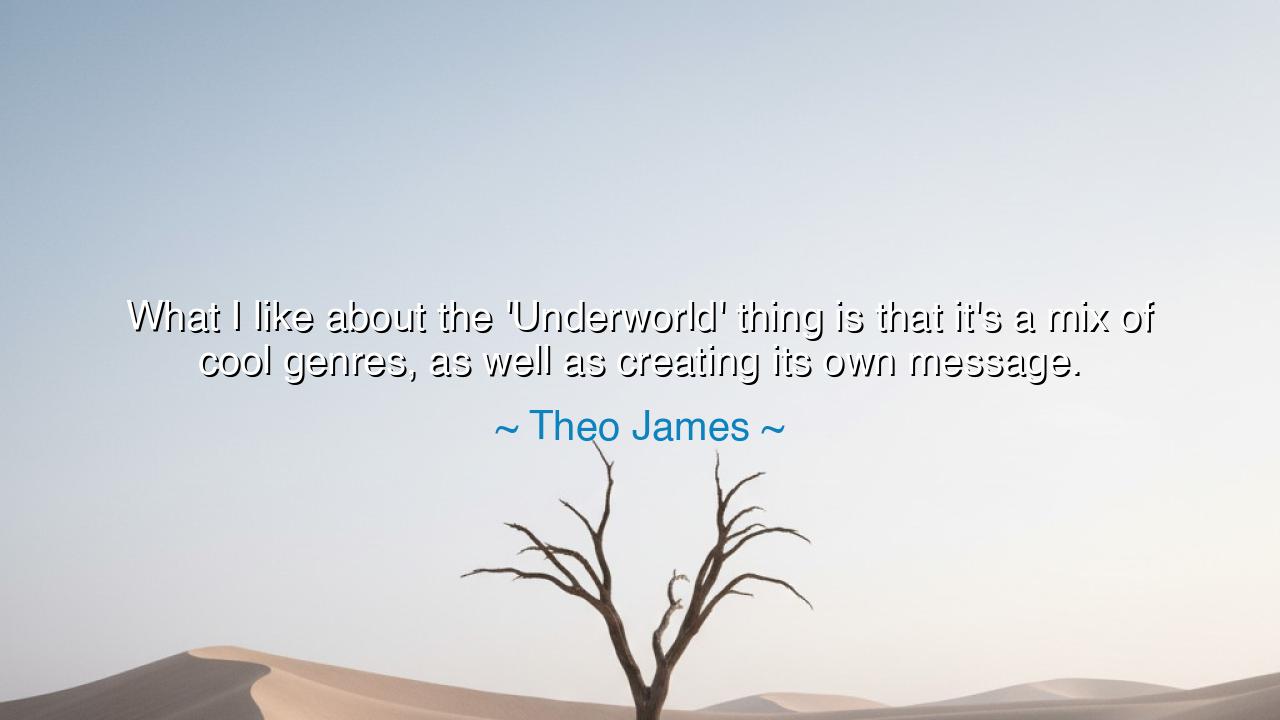
What I like about the 'Underworld' thing is that it's a mix of
What I like about the 'Underworld' thing is that it's a mix of cool genres, as well as creating its own message.






The actor Theo James, reflecting on his role in the Underworld saga, once said: “What I like about the ‘Underworld’ thing is that it’s a mix of cool genres, as well as creating its own message.” Though his words speak of film and art, within them lies a deeper wisdom — one that touches upon the essence of creation itself. For in this age-old truth we find that the greatest works, whether of art, story, or soul, are born not from imitation, but from synthesis — the union of what has come before into something entirely new. To mix, to blend, to create one’s own message — this is the divine act of transformation, the mark of originality that has guided thinkers, artists, and dreamers since the dawn of civilization.
To mix genres is to recognize that truth is rarely contained in a single form. The Underworld films, which weave together elements of fantasy, horror, myth, and action, embody this principle — they are not confined to one voice, but many. In this, Theo James speaks not only of cinema, but of the very nature of creativity. For the ancients, all great creation was alchemy — the art of merging different elements to form something more powerful than its parts. The sculptor drew from nature and spirit, the philosopher from reason and mystery, the poet from beauty and pain. So too does the modern creator, knowingly or not, echo this ancient law: that innovation is born from balance and fusion.
The origin of this idea reaches far beyond the screen. In the time of Aristotle, it was said that art imitates life, but also perfects it — that by combining forms and ideas, the artist reveals truths invisible to the eye. Likewise, in the Renaissance, the masters — Leonardo da Vinci, Michelangelo, Raphael — did not bind themselves to one discipline, but drew from science, anatomy, poetry, and faith, blending them into creations that transcended each category. Their genius lay not merely in their talent, but in their integration — the courage to take the known and remake it in their own image. This is what Theo James honors in his reflection: that Underworld, while inspired by myths of vampires and warriors, creates its own mythos, its own meaning, standing apart from those who came before.
To create “its own message,” as he says, is to reach beyond the surface of genre and into the soul of art — the realm where stories speak not just of entertainment, but of truth. Every great story, from the Odyssey of Homer to the epics of today, carries a hidden reflection of its time: a message about love, power, loyalty, or the eternal struggle between light and shadow. The Underworld saga, for all its stylized battle and dark beauty, speaks of something universal — the conflict between duty and freedom, the ancient tension between what we are told to be and what we choose to become. In recognizing this, Theo James reminds us that true art does not merely repeat old stories; it reinterprets them for new generations.
History, too, offers us an example in the story of Dante Alighieri, the author of The Divine Comedy. In his masterpiece, Dante took theology, poetry, and myth — all separate genres in his time — and bound them into one cosmic journey through Hell, Purgatory, and Paradise. His vision was not derivative, but transformative; through blending tradition with his own voice, he created something eternal. The same principle echoes in James’s reflection — that greatness is born when the artist dares to merge the familiar and the original, crafting not imitation, but revelation.
To mix genres is, in truth, a mirror of the human soul itself. For within each of us lies a blend of contradictions — strength and fragility, logic and emotion, light and shadow. When we express these contradictions truthfully, we create art, wisdom, and meaning that speak to others. The world does not need perfection; it needs authenticity. Thus, Theo James’s words become a call to every creator and every seeker: do not fear mixture, do not fear complexity. From diversity of thought comes the unity of truth. From the blending of differences, harmony is born.
The lesson, then, is simple yet profound: do not merely imitate — create. Draw from what moves you, learn from what inspires you, and then shape it into something that bears your own spirit. Whether in art, in work, or in life, seek not to fit one mold, but to forge your own. The future belongs to those who are not afraid to experiment — to merge the old with the new, the known with the unknown. In doing so, you will not only honor the past but also speak to the heart of the present.
So let Theo James’s words stand as a modern echo of an ancient truth: that all creation is fusion, and all originality is born of courage. To live creatively is to weave together the fragments of life — joy and sorrow, tradition and change — into something uniquely your own. For in that act, whether through art, story, or simple living, you too will create your own message, one that will endure beyond the fleeting fashions of time, and speak, as all great works do, to the eternal soul of humankind.






AAdministratorAdministrator
Welcome, honored guests. Please leave a comment, we will respond soon